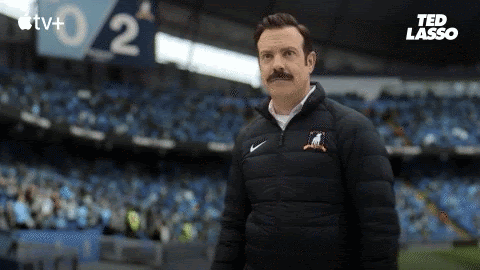Achievement GOOOOOOAAAAAALLLLLLLL
Ted Lasso is the quintessential character and lens that one would want to look at achievement goals and instrumentality through. The entire premise of this show is about Ted trying to achieve this long term goal of JUST being a good coach, friend, father, and husband. However, there are several smaller goals that he works through in order to get to that place of being good enough in all of those areas. Before we get to that, we have to first explore what achievement goals are and what instrumentality is.
Achievement goals are summarized as being the goal outcome people place on the tasks at hand. There are two main achievement goals. Those are mastery goals and performance goals. (Reeve, 2009) When a person decides to pursue mastery goals, they are pursuing greater competence by mastering a skill. Mastery goals are purely internally motivated. People pursue mastery goals just to get better over time. An example of a mastery goal is someone who takes French classes. If they have mastery goal motivation, then they are just worried about becoming fluent in the language and not getting a good grade. With performance goals, people are looking externally for feedback and validation outside of the goal itself. They are pursuing this goal to “be the best” or “get the highest score/grade/praise”. The same French class example through the lens of performance goals would be a person getting in French class and wanting to achieve the highest score on all the assessments.
The next, is instrumentality. Instrumentality, or utility, is when people take into consideration their current goals and relating them to their long-term future goals. This was demonstrated in an article written by Husman and Lens in 1999 when they discussed students intrinsic and extrinsic motivations as it pertains to academic motivations and goals. Students learned that there was a connection with their long-term goals by doing well in their auxiliary short term goals. (Husman & Lens 1999).
Ted Lasso exhibits both concepts in Season 1, episode 6. The first I want to point out is Ted’s mastery goal motivation in coaching this soccer team. Ted has never coached a soccer team before, but he believes that he can always learn because he feels he has a good foundation. All the Richmond fans want him to win (performance goal) however, Ted just wants to get better than the last time. There is even a quote in the episode where he says “….I believe you can outscore your opponent and still lose. Just like you can score less than them and still win.” That speaks to Ted just wanting to get increasingly better overall rather than JUST winning a soccer game. That does not mean that Ted does not want to win soccer games, however, that is not the overall goal. He has more intrinsic motivation rather than extrinsic. The great thing about Ted is that for most of the show, Ted’s values do not change from these goals. Yes, Ted does want to win. However, his value of wanting to just be a good coach and have a good team is paramount.
There is also an instrumentality aspect to Ted’s goals as well. He currently has benched one of the best players on the team, Jamie Tartt. The primary motivation from Ted is because he is tired of Jamie acting like a know it all. That is because Ted values teamwork and community. Because of this value, he knows that, even though Jamie is a great player, he has to bench him in order to reach the goal of having a collaborative team. He does not only see utility in benching Jamie, he also sees the utility in bringing the guys together for outside of soccer events, building a relationship with a team owner who is trying to sabotage him, and by empowering his equipment manager into an assistant coach.
This is why I believe Ted is the perfect person to view these concepts through as a tv show character!



Comments
Post a Comment